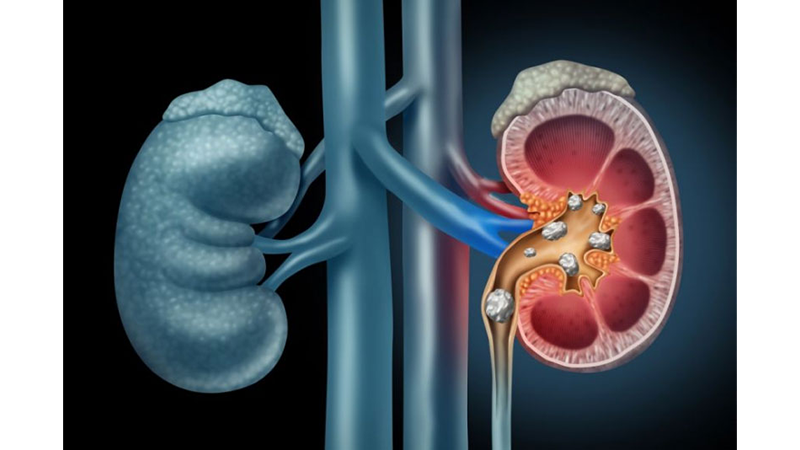
Kidney Stones: Causes, Symptoms, and Treatment Methods
- Kidney stone disease is a chronic, recurring metabolic disorder characterized by the presence of stones in the urinary system, namely the kidneys, urinary tracts, and bladder. The main cause of kidney stones is a metabolic disorder that leads to the formation of insoluble salts, which then form stones. The number and location of stones can vary.
- Dietary factors can also influence stone formation, including poor and contaminated water, monotonous diet, regional climate conditions, hot climate, certain medications, urinary system developmental abnormalities, hyperparathyroidism, vitamin A and D deficiencies, chronic urinary tract infections (pyelonephritis, cystitis), and hereditary factors.
- Types of stones based on cause and composition:
- • Calcium stones — up to 70%
- • Uric acid stones — up to 12%
- • Infected stones — up to 15%
- • Cystine stones — 2-3%
- Symptoms
- Depending on the stone’s location, patients may experience various symptoms. The main symptoms include:
- • Acute pain: When the stone is in the upper part of the kidney, sharp pain typically occurs in the lower back and under the ribs. The pain can be sharp or dull, and may recur intensely at intervals of 20 to 60 minutes. Sometimes physical activity, drinking plenty of fluids, and diuretics help ease the pain. The pain may shift depending on the stone's movement through the urinary tract, migrating from the lower back to the abdomen, lower belly, testicles, or inner thigh. Frequent urination is also common. It is important not to confuse kidney stone symptoms with acute appendicitis, cholecystitis, pancreatitis, intestinal obstruction, hernia, ectopic pregnancy, stomach or duodenal ulcers. Immediate medical attention is necessary for proper diagnosis.
- • Blood in urine: Presence of blood may indicate kidney stones. Cloudy, foul-smelling urine can also be a sign that a stone is passing.
- • General malaise, especially nausea and vomiting: These symptoms are characteristic of pyelonephritis (kidney inflammation).
- • Passing stones or sand: This may be accompanied by high fever and chills.
- Diagnosis
- If you have these symptoms, you should see a urologist. The doctor may order additional tests and decide on the treatment. Basic diagnostics include:
- • Medical history and physical examination
- • General urine and blood tests
- • Ultrasound and X-ray of the urinary tract
- Additional tests:
- • Computed tomography (CT)
- • Urine antibiotic sensitivity testing to detect infections and inflammation in the urinary tract
- Treatment
- • Medication: to help pass the stone
- • Medication: to dissolve the stone
- • Open surgery
- • Lithotripsy (stone crushing)
- • Endoscopic contact lithotripsy
- • Endoscopic surgical intervention
- Only a professional urologist equipped with modern diagnostic and treatment tools can determine the best treatment method for you.
- Stay healthy!
29 August 2020
Loading...